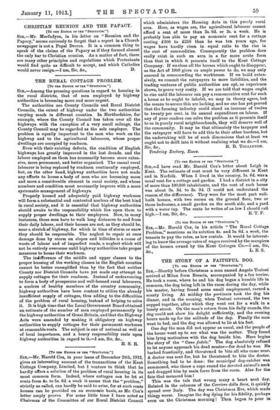[To THE EDITOR OE THE "SPECTATOR."] Sue, — Mr. Harold Cox, in
your issue of December 28th, 1912, gives an interesting account of the transactions of the Kent Cottage Company, Limited, but I venture to think that he hardly offers a solution of the problem of rural housing in its most common form. Indeed, where cottages can be let at rents from 43. to 5s. 6d. a week it seems that the "problem," strictly so called, can hardly be said to arise, for at such rents houses can be provided on an economic basis, as Mr. Cox's letter amply proves. For some little time I have acted as Chairman of the Committee of our Rural District Council
which administers the Housing Acts in this purely rural area. Here, as wages are, the agricultural labourer cannot afford a rent of more than 2s. 6d. or 3s. a week. He is probably less able to pay an economic rent for a cottage costing 2200 to 2250 than he was ten years ago, for wages have hardly risen in equal ratio to the rise in the cost of commodities. Consequently the problem does really exist in such an area in a far more acute form than that in which it presents itself to the Kent Cottage Company. If we close all the houses which ought to disappear, as the Act of 1909 gives us ample power to do, we may only succeed in overcrowding the workhouse. If we build exten- sively, we commit the ratepayers to more liabilities, and the trading ventures of public authorities are apt, as experience shows, to prove very costly. If we are told that wages ought to rise until the labourer can pay a remunerative rent for such a house as he ought to inhabit, we may in theory agree, but the means to secure this are lacking, and no one has yet proved that the farming industry could stand an increase of twelve to twenty per cent. in its annual expenditure on labour. If any of your readers can solve the problem as it presents itself to us in purely rural neighbourhoods, they will deserve well of the community. It may be that ultimately the taxpayer and the ratepayer will have to add this to their other burdens, but the undertaking will be of such dimensions that at least we ought not to drift into it without realizing what we do.—I am,










































 Previous page
Previous page